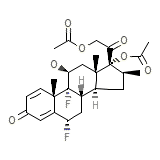Maxiflor




Maxiflor Brand names, Maxiflor Analogs
Maxiflor Brand Names Mixture
- No information avaliable
Maxiflor Chemical_Formula
C26H32F2O7
Maxiflor RX_link
http://www.rxlist.com/cgi/generic/diflorasone.htm
Maxiflor fda sheet
Maxiflor msds (material safety sheet)
Maxiflor Synthesis Reference
No information avaliable
Maxiflor Molecular Weight
494.525 g/mol
Maxiflor Melting Point
No information avaliable
Maxiflor H2O Solubility
No information avaliable
Maxiflor State
Solid
Maxiflor LogP
2.465
Maxiflor Dosage Forms
Cream; Ointment
Maxiflor Indication
For relief of the inflammatory and pruritic manifestations of corticosteroid responsive dermatoses.
Maxiflor Pharmacology
Like other topical corticosteroids, diflorasone has anti-inflammatory, antipruritic, and vasoconstrictive properties. Once absorbed through the skin, topical corticosteroids are handled through pharmacokinetic pathways similar to systemically administered corticosteroids. Diflorasone is a potent topical corticosteroid that should not be used with occlusive dressings. It is recommended that treatment should be limited to 2 consecutive weeks and therapy should be discontinued when adequate results have been achieved.
Maxiflor Absorption
Topical corticosteroids can be absorbed from intact healthy skin. The extent of percutaneous absorption of topical corticosteroids is determined by many factors, including the vehicle and the integrity of the epidermal barrier. Occlusion, inflammation and/or other disease processes in the skin may also increase percutaneous absorption.
Maxiflor side effects and Toxicity
Topically applied diflorasone can be absorbed in sufficient amounts to produce systemic effects. Symptoms of overdose include thinning of skin and suppression of adrenal cortex (decreased ability to respond to stress).
Maxiflor Patient Information
Maxiflor Organisms Affected
Humans and other mammals














